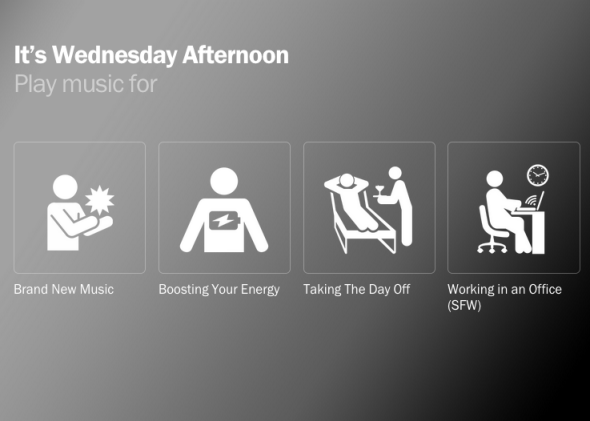Google is buying Songza, a streaming music service that most people have never heard of. It’s a fascinating move, for several reasons.
That Google was in the market for a music service was no secret. It’s a hot sector, and one with great potential for targeted advertising. Google’s move comes a few weeks after Amazon announced its own streaming music service and a month after Apple bought Beats for $3 billion, about $500 million of which was said to cover the Beats Music streaming service. Songza’s price has not been disclosed, but it’s almost certainly a tiny fraction of what Apple paid for Beats. The New York Times on Wednesday reported that Google may have bought it for just $39 million.
That makes it sound like Google is scraping the bottom of the bargain bin. In fact, Songza claims 5.5 million active users. That’s a long way from Pandora’s 80 million or Spotify’s 40 million. But it’s actually a lot more than Beats Music, which reportedly has just a few hundred thousand, if that.*
More importantly, Songza might actually be more interesting than Beats—and more complementary to Google’s business model.
Songza and Beats are similar in that they employ human editors to create coherent playlists, rather than automatically generating radio stations based on similarity metrics. Beats tries to learn users’ preferences in order to serve up human-curated playlists that might interest them. Songza takes a different tack, drawing on information about time of day and location to offer human-selected playlists that might be appropriate to the user’s immediate circumstances. Check in on a Wednesday afternoon, and it will suggest playlists appropriate to working in an office or boosting your energy. Open Songza on a Friday night, and it might propose dance mixes, mood music, or party rock.
In my experience, Songza feels the coziest of the major streaming services. It’s easy to sense that the intelligence behind its playlists is human rather than artificial. My colleague Aisha Harris sang its praises a year ago, calling it “the best music streaming site there is.” If I had to choose just one, I’d still opt for Spotify, but that’s because I’m a control freak. At the very least, Songza is a welcome complement to Spotify, and an appealing alternative to Pandora.
What’s most interesting about the acquisition, though, is what it represents for Google. It’s an acknowledgement that its mighty machine-learning algorithms need some human assistance after all, especially when it comes to a realm as complex as music.
The company already has its own streaming service, Google Play Music. But it’s years behind Pandora when it comes to understanding what makes music lovers bob their heads. As Business Insider’s Megan Rose Dickey observes, “music doesn’t respond to search algorithms—Google’s key strength—the way simpler media like words or images do.” In acquiring Songza, Google is acquiring human insight.
But just because Google’s machines don’t know everything doesn’t mean they aren’t still trying. With Songza, Google isn’t just acquiring knowledge about music. It’s also acquiring data about people. And the data Songza collects about its users is much more interesting than the data that Beats collects.
Beats just asks people which artists and genres they like. That’s information you could get pretty easily in other ways. Songza asks users what they’re doing right this moment. That’s information that could be incredibly valuable to advertisers, not to mention other Google services like search and Google Now. Among other things, it ups the pressure on Twitter, whose main advertising niche is understanding what its users are doing at any given moment. Twitter has tried and failed to build a music service of its own.
Songza says it isn’t planning any immediate changes to its service as a result of the deal. But the Wall Street Journal reports that Google mays use Songza’s technology and expertise to improve both Google Play Music and YouTube. And while neither Google nor Songza is talking about it right now, it’s probably only a matter of time before it starts harnessing Songza’s data for advertising as well.
How are you feeling now, Songza lovers? Are you “Walking on Sunshine?,” as the startup’s leaders say they are? Are you planning to “Run for Your Life?” Or at this point are you beginning to think, “I Don’t Care Anymore?”
*Granted, Beats is $9.99 a month, while Songza is free. And Songza has been around longer. Regardless, the revenue numbers we’re talking about here would hardly amount to a rounding error on Google’s balance sheet.
Update, July 2, 2014: This post has been updated to include a footnote that was accidentally left out.
